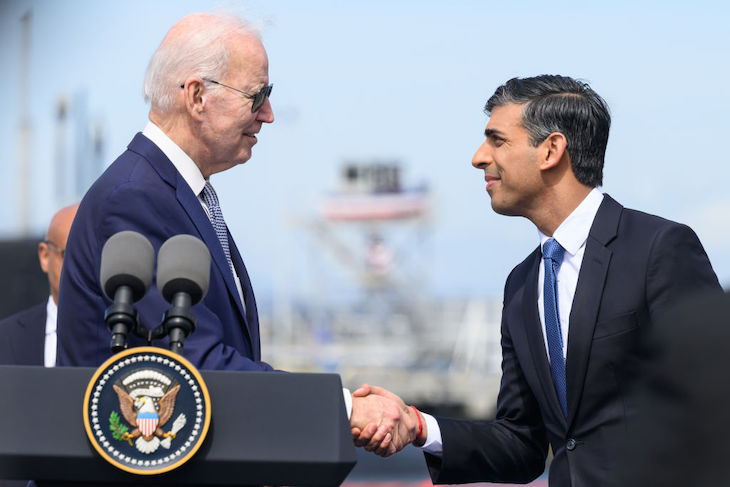Aukus is one of the most significant security pacts in modern history. It marks a bold new era in how we think about our alliances and our national resilience. Brits are on board with the pact: 64 per cent are confident about its ability to make us safer; a similar number (65 per cent) think it will make the UK more competitive towards China.
After 18 months of intensive research and negotiations, the Aukus trilateral pact is finally taking shape. An elegant solution has been found for Australia’s submarine deficit, with Rishi Sunak joining the American and Australian leaders in San Diego in the United States to announce the launch of a state-of-the-art SSN-Aukus submarine project. It will take a phased approach, harnessing the best of each partner’s capabilities, and delivering vital new strength and capacity to all three defence industrial bases.
Submarines are just the beginning
For the UK, this multi-decade submarines project will enhance our skilled workforce in Barrow-in-Furness in Cumbria, deliver jobs and contracts for British companies, and allow us to contribute to a deterrence mechanism to uphold stability in the global order. It will showcase Britain’s renowned expertise in submarine design and sonar technology, and allow us to deepen our relationships with our two closest security partners. Our role in this project will also inject hard power into our Indo-Pacific presence, even as the defence budget strains under the pressures of our vital Ukraine commitments.
It hasn’t all been smooth sailing. There were fears Britain may lose out in the negotiations to the might of the US defence industrial complex. Engagement between the government and the enthusiastic community of industry partners has been sclerotic at times. In the end, diplomacy prevailed, and the emphasis on a balanced trilateral approach allowed an agreement to be reached that is genuinely a win-win-win.
Aukus is a practical project, but one forged with an awareness of the symbolic weight of its existence. Although you won’t find it in any of the official messaging, this is a pact responding to the rise of a truly distinct strategic competitor in China. It links two of the primary security theatres of the Euro-Atlantic and the Indo-Pacific, and strengthens America and its allies’ defensive posture in both regions.
Submarines are just the beginning. The intense scrutiny around the ‘optimal pathway’ has obscured the significance of the second pillar of the Aukus pact, which will also now kick into gear. With the submarines project stretching out across decades, it is this part of Aukus that will show the earliest dividends. Pillar Two will promote advanced technological co-creation and cooperation between the three allies, including in many innovation areas for which Britain is at the global forefront. Trilateral co-creation on areas such as hypersonics, AI and cyber, should allow British firms of all sizes to scale up their activities and get vital new technologies to market more quickly.
The transformative nature of the pact cannot be overstated. For Aukus to succeed, all three countries will need to dramatically shift their approach to their defence industrial bases, and work in lockstep to a degree unprecedented in the past half-century. The US must rethink its current policies on export controls and international arms transfers, which will almost certainly require presidential intervention. Here too, a significant cultural change in Whitehall will need to transpire to encourage collaboration over competition between defence firms, and to strengthen connections between government, academia and industry.
Britain cannot compete alone against the power of Chinese technological development, but Aukus will provide the scale needed to help prevent another crisis like Huawei emerging. The intimacy and trust that will underpin the technological co-creation projects is only possible because of the unique, established intelligence relationship between the three countries. Still, economic and technological resilience will need to be a priority for all our closest international partners. In creating a laboratory for this new form of intensified co-creation, and in shaking up the defence culture in Washington, the benefits of Aukus will extend to a much wider group of allies.
We have come a long way since the initial Aukus announcement. All three parties have played their part in securing wider support for the project. The French and Australian leaders have broken bread, and in the UK-France Summit last week, both countries pledged to cooperate more closely on defence in the Indo-Pacific. Great care has been taken to sensitively engage Asean partners on Aukus; many been persuaded that this initiative will contribute to a more stable, balanced regional security order.
The British people agree: a majority of Brits (54 per cent) are convinced that Aukus will act as a meaningful deterrent against future Chinese aggression in the Indo-Pacific. With the weight of the British public behind the pact, it’s now up to the government to make the most of this unique opportunity.






Comments